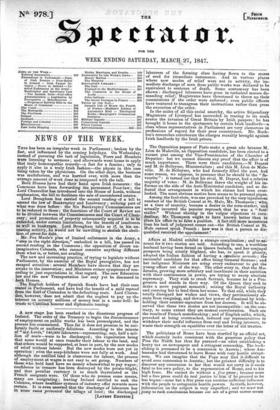NEWS OF THE WEEK.
THIS has been an irregular week in Parliament ; broken by the fast, and influenced by the coming bolydays. On Wednesday, instead of pursuing the task of legislation, Peers and Members were listening to sermons ; and afterwards went home to apply that truly homoeopathic remedy—a fast for a famine ; only to apply it also in a truly Irish fashion—the physic in this case being taken by the physicians. On the other days, the business was multifarious, and was hurried over, with more than the average amount of work done as compared with the talk. Both Houses have had their hand. upon Irish measures : the Commons have been forwarding the:permanent Poor-law; the Lord Chancellor has introduced into the House of Lords, without explanation, the bill to facilitate the sale of encumbered estates.
Lord Brougham has Carried the second reading of a bill to amend the law of Bankruptcy and Insolvency ; undoing part of what was done before : the Six Bankruptcy Commissioners are to be reduced to three ; the functions of the Court of Review are to be divided between the Commissioners and the Court of Chan- cery; and protection of property subsequently acquired is to be extended, under certain limitations, for the benefit of insolvents as well as bankrupts. Lord Brougham talks as if, in his un- ceasing activity, he would not be unwilling to abolish the aboli- tion of arrest for debt.
My. Fox Maule's" plan of limited enlistment in the Army, a " step in the right direction," embodied in a bill) . has passed its second reading -in the- Commons ; the opposition of divers un- imaginative Colonels, who cannot conceive anything different from what is, or better, not availing.
The new and increasing practice, of trying to legislate without Parliament, by the exercise of the Royal prerogative, has not escaped attention : several Members 'have shown that they are awake to the innovation; and Ministers evince symptoms of con- ceding to just expectations in, that regard. The new Education law and the new Transportation law may yet be discussed in both Houses. , The English holders of _Spanish Bonds have had their case stated in Parliament, and have had the benefit of a mild reproof from the Etirl of Clarendon to the defaulting state. Lord Claren- don, however,' does not admit that the neglect to pay up the interest on seventy millions .of money lent is a cases belli: he trusts to Castilianhonour and diplomatic teasing.


























